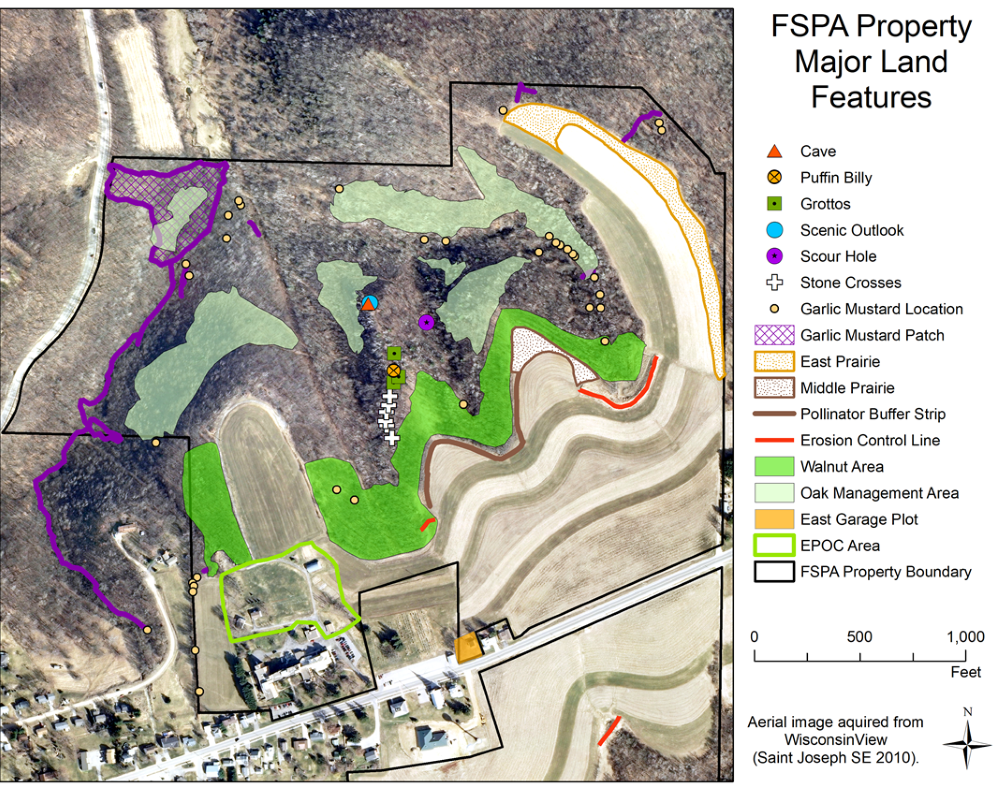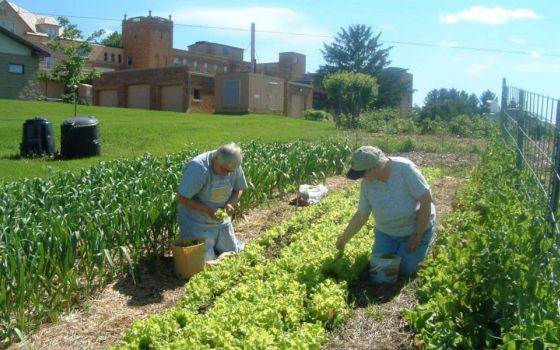For more than a century, the grounds of Villa St. Joseph of the Franciscan Sisters of Perpetual Adoration have been mostly private property. But that's slowly changing.
On many days, across the sprawling acreage of grassy hills, hearty gardens, walnut plantations and restored oak savannah, you can find volunteers, students and others looking to learn from the land.
Indeed, the estimated 200 acres roughly a dozen miles east of the Mississippi River have become a living classroom for the wider La Crosse community here in western Wisconsin.
"This has been very privately held for a century plus, and it's just slowly opening up by invitation to people," said Beth Piggush, the congregation's integral ecology director.

The activity is the result of the Franciscan sisters' decision to dedicate this land, where a farm once operated, to continue benefiting the sisters and the surrounding community, albeit in new ways.
At a 2013 chapter gathering, the sisters agreed to designate the farmland "as permanently committed to educational purposes" related to land preservation and environmental sustainability.
Four years later, they approved a plan to make farmland available for collaborative sustainability projects that could serve as an example to others of practices and principles related to ecological integrity, restorative agriculture, soil rehabilitation and sustainable woodland practices.
The sisters have also set aside portions of the land for what they call a collaborative educational sustainability project. Beginning in January 2022, local people will be able to apply to use the land to grow their own food.
The educational focus fits well with the congregation's Franciscan values of experiencing God's presence in nature and its long tradition of education ministry.
"There were a good number that wanted to make sure that it would be kept as an educational [site] and not developed," said Sr. Lucy Slinger, a member of the congregation's leadership team and its ecological advocate.
Rooted in farming past
Today, the villa is home to the sisters' long-term care facility. But originally the land of the Franciscan Sisters of Perpetual Adoration, dating to 1895, was a farm, complete with a dairy barn and orchard. Over the years, a schoolhouse, hospital and convent were added.
The many projects that students and staff have led on the land, from mapping the acres to identifying native plant and animal species, have offered a window into the congregation's past.
Deep in the woods sits "Puffin Billy," a secluded spot where sisters visiting the villa for summertime breaks would hike, picnic and make pancakes over a stone stove. Around the spot are rock grottos, which classes of sisters would sometimes construct in community. Nearby, a series of small stone crosses identify what was likely once a stations of the cross path.
In 2000, the sisters began discussions of what to do with the land. Those picked up by 2007, when Slinger, a biologist, was named ecological advocate and began working on a long-range sustainability plan for the villa's land. Partnering with the Mississippi Valley Land Conservancy, the sisters identified ecosystems, took base counts of species and sampled the soil.
Advertisement
They also came across signs of disrepair. Hillsides show the effects of increasing erosion, as heavier rains have become more frequent, a likely impact of climate change. And invasive species like honeysuckle, barberry bush and garlic mustard are found across the grounds.
Eventually, an ecospirituality committee was formed, and by 2009, the sisters had drafted a congregational land ethic statement, which outlined their beliefs on what land represented— "the visible handiwork of God" — and their calling to share the land for the greater good. That especially means for the benefit of the poor and the Earth itself, and preserving it through sustainable ecological practices.
A land sustainability policy created in May 2016 identified four guiding principles: respect for Earth, ecological integrity, ecojustice and integration for life.
Those guiding principles led the sisters to explore the best ways to use the land. They have created a greenhouse and planted a full organic garden.
In 2009, the sisters received approval from the county for green burials. So far, 17 sisters are buried in specially marked circles in a section of land near Tranquility Hill.
"They're natural," said Sr. Sharon Berger, who was involved with establishing the burial site. "It's just a different way of seeing that this is part of the natural cycle of things."
Seeking a balance
At one point, several Franciscan sisters sought to place the land at the villa in a conservation easement, a legal protection that prevents future development of the land, as the sisters had done in 2019 with their Prairiewoods spirituality center in Hiawatha, Iowa. But the congregation as a whole wasn't quite ready, Berger said.
At first, some sisters worried that an easement would prevent younger sisters from selling the land should they have financial need in the future. Others expressed concern that it would limit the types of education projects already taking place.
Other factors came into play with a potential easement. In Wisconsin, landowners must agree to allow some level of public access to the land, said Piggush, who serves on the board of the Mississippi Valley Conservancy. That was a concern for some sisters, who still see the villa as their home and the land their backyard.
"We need to have more discussions. I'm convinced that that's what we want to do," Berger said, though she added, "When things are ready to happen, they will happen."
Added Piggush, "It really is that vision of what is the long-term goal and what do you want people to be able to do on it. Because those agreements are lifelong."

A map shows the main features of the property of the Franciscan Sisters of Perpetual Adoration in La Crosse, Wisconsin. (Courtesy of FSPA)
But while easement discussions have been tabled for now, activity continues.
Area colleges, like Viterbo University, which was founded by the congregation, have sent students and faculty to conduct research and capstone projects. Art and biology classes from the University of Wisconsin-La Crosse have also visited the land.
There have been entomology studies of mason bees, students growing micro greens and mushrooms, trail cameras to monitor wildlife, Service Saturdays for Viterbo students and field trips for 4-H clubs. A local farmer has rented fields to experiment with organic farming techniques and regenerative soil practices.
The grounds also offer respite for sisters seeking to reconnect with nature. While some work in the gardens, others cut flowers to create bouquets for Masses and prayer services.
The growing list of projects shows that conservation can take many forms. While an easement remains the goal for some of the sisters, it is not the only option.
Piggush described the congregation as being in active relationship with the land
"It's finding that balance and looking at ways to restore [land] so it's not just human-centric, give, give, take, take, but looking at how it's been balanced in the past, and best practices that can be shared in that relationship ... between people and planet," she said.
[Editor's note: The Franciscan Sisters of Perpetual Adoration are major funders of EarthBeat, and established the Laudato Si' Fund to help endow NCR's coverage of the climate crisis. Reporting for this story was made possible, in part, by the Solutions Journalism Network.]





